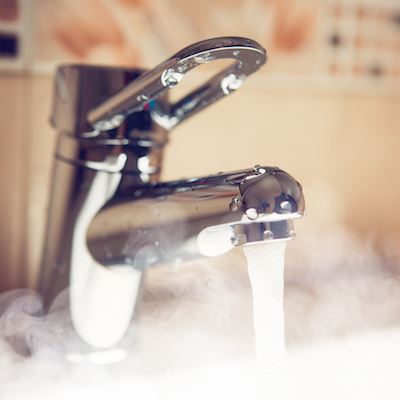The average water heater needs replacing approximately every eight to twelve years. That means over your lifetime, you won’t have the opportunity to purchase more than a few of them. And when you’re only considering your options every decade or so, technological advances can confuse you and make your decision more difficult.
If you’re in the process of buying a water heater, here are a few things to keep in mind.
Type of water heater
 Most water heaters are fueled either by gas or electricity. If your tank water heater uses gas, you should also confirm whether it uses natural gas or propane. A natural gas water heater usually has more up-front costs for the unit and installation, but has lower operating costs over the life of the equipment. Gas appliances require special ventilation; if you already have a gas water heater, it should be in place. Electric water heaters may be less costly up-front, but because of fluctuating electrical costs, almost always cost more over the life of the water heater. It does cost money to convert; discuss it with one of our HVAC technicians if you have any questions.
Most water heaters are fueled either by gas or electricity. If your tank water heater uses gas, you should also confirm whether it uses natural gas or propane. A natural gas water heater usually has more up-front costs for the unit and installation, but has lower operating costs over the life of the equipment. Gas appliances require special ventilation; if you already have a gas water heater, it should be in place. Electric water heaters may be less costly up-front, but because of fluctuating electrical costs, almost always cost more over the life of the water heater. It does cost money to convert; discuss it with one of our HVAC technicians if you have any questions.
Storage
Most people think of a tank when they think water heater. The tank water heater has been around for decades, and continues to be one of the most popular ways to heat and store water. As a homeowner uses hot water, cold water enters the bottom of the tank, ensuring the tank is always full. It is continuously heated so it’s available as you draw from the tank. Of course, you can only draw the water supply held by the tank; if you use it all, it will take time to reheat the incoming water. Tanks, in general, range from 20 to 60 gallons. Install one based on home and family size to ensure you always have enough water.
That’s why many people are turning to another option – a tankless water heater. With a tankless water heater, cold water travels through a pipe into the unit, where it is heated and delivered via another pipe to your fixtures. A tankless water heater will never run out of hot water because it produces it as you request it. The one drawback is output. They have specific flow rates, which can be a problem if multiple people request hot water at once. One solution is to have more than one tankless water heater in the home, depending on needs.
Energy Efficiency
While it might seem like a tankless water heater is the most efficient, that isn’t always the case. A lot of it depends on your home and your lifestyle too. Even the tank water heaters on the market today are some of the most energy efficient appliances you can buy. The Federal energy standards are always changing, meaning you can find tank systems that have very little heat loss as it produces hot water. Just look for the highest rating and you’ll know you’re as energy efficient as you can be.
Is this the year you’ll trade in your old unit, and consider buying a water heater that meets your every demand?

